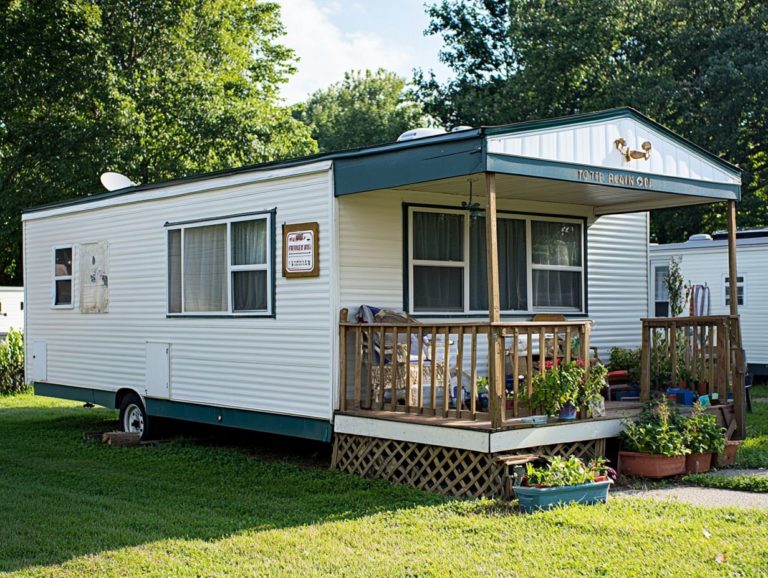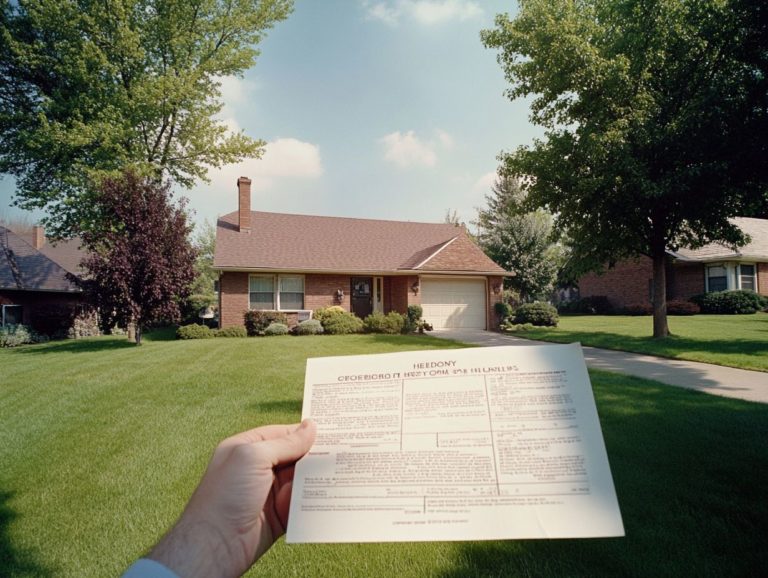The Best Home Insurance Questions to Ask an Agent
Home insurance can be a complicated subject, often leaving homeowners feeling overwhelmed.
Grasping the specifics of what your policy encompasses along with the limits, deductibles, and any exclusions is essential for protecting your investment.
This article delves into the most pertinent questions you should pose to your insurance agent, from evaluating your coverage needs to uncovering potential discounts.
Whether you’re a first-time homeowner or considering an update to your existing policy, these insights will empower you to navigate the realm of home insurance with confidence.
Contents
- Key Takeaways:
- 1. What s Included in My Home Insurance?
- 2. What Are My Limits and Deductibles?
- 3. Are There Any Exclusions or Limitations?
- 4. What Is the Process for Filing a Claim?
- 5. How Much Coverage Do I Need?
- 6. Are There Any Discounts Available?
- 7. Can I Customize My Coverage?
- 8. How Often Should I Review and Update My Policy?
- 9. How Does My Location Affect My Insurance Premium?
- 10. What Happens If I Have a Home Business?
- 11. What Types of Natural Disasters Are Covered?
- 12. Are My Personal Belongings Covered?
- 13. What Is the Difference Between Replacement Cost and Actual Cash Value?
- 14. How Can I Lower My Premium?
- 15. What Are the Different Types of Home Insurance Policies Available?
- Frequently Asked Questions
Key Takeaways:

Know your coverage to avoid unexpected surprises during a claim.
Understand your policy’s limits and deductibles, which is the amount you pay out of pocket before your insurance helps with a claim, to ensure you have adequate coverage.
Inquire about any exclusions or limitations in your policy to understand what may not be covered in the event of a claim.
1. What s Included in My Home Insurance?
Understanding what your homeowners insurance covers is crucial for safeguarding both your property and your finances.
Here s what your coverage usually includes:
- Dwelling coverage
- Personal property
- Liability coverage
- Additional living expenses that may arise from unforeseen events
Dwelling coverage acts as a protective shield for the physical structure of your home, ensuring that any repairs needed due to incidents like fire or wind damage won’t leave you financially stranded.
Personal property coverage is your safety net for belongings, meaning if a thief breaks in and takes your electronics or furniture, you can recover those losses without a significant financial hit.
Liability coverage is critical; it covers medical expenses if someone injures themselves on your property, offering protection against potential lawsuits.
If you need to move temporarily due to a disaster, additional living expenses can help cover the costs.
For instance, in the unfortunate event of a severe hailstorm damaging your roof, you can take comfort in knowing that your policy may cover both the repairs and any temporary housing costs incurred.
2. What Are My Limits and Deductibles?
Insurance deductibles and coverage limits are pivotal factors in shaping your overall insurance costs.
They determine the amount you pay out-of-pocket before your homeowners insurance policy comes into play, as well as the maximum payout the insurer will cover for claims.
Opting for a higher deductible can often lead to lower premium rates, making the prospect of larger out-of-pocket expenses tempting if a claim arises.
On the flip side, lower deductibles usually mean higher premiums but offer greater financial security in the event of damage.
It s essential for you to fully understand your coverage limits, too, as these thresholds can greatly affect the compensation you receive in case of property damage.
Failing to recognize them may result in unexpected expenses when it s time to file a claim.
3. Are There Any Exclusions or Limitations?
Homeowners insurance policies often come with a variety of exclusions and limitations that can significantly impact your coverage.
Specific perils, such as earthquakes or floods, may require additional endorsements or even separate flood insurance policies.
Understanding these exclusions is essential, as they can lead to considerable financial burdens if unexpected damage occurs.
For instance, many policies impose limitations on high-value items like jewelry, art, or collectibles, often capping coverage at lower amounts unless you add specific riders.
Natural disasters, such as hurricanes or wildfires, might also be excluded based on your home’s geographic location.
It s vital for you to take the time to carefully assess your risks and needs, thoroughly reviewing your policies to ensure you’re fully aware of any gaps in coverage.
These oversights can lead to costly surprises when it matters the most.
4. What Is the Process for Filing a Claim?
Filing a claim for property damage under your homeowners insurance involves several essential steps that are crucial for a successful outcome. Start by meticulously documenting the damage, including taking clear, detailed photos of the affected areas and items. These images serve as vital evidence to support your claims.
Once you’ve gathered your documentation, contact your insurance agent right away to discuss your situation. They will guide you through the necessary paperwork and provide important insights regarding your coverage limits.
As you complete the required forms, ensure that every detail is accurate and concise. Precision can significantly impact your claim s approval. When communicating with insurance providers, adopt a polite yet assertive tone and keep meticulous records of all conversations and correspondence.
This organized approach boosts your chances for a smooth claims process and positions you to resolve any potential disputes efficiently.
5. How Much Coverage Do I Need?

To protect your investment, assess factors like rebuilding costs and the value of personal property. This includes considering any additional living expenses you might face during repairs.
Evaluate the overall value of your property, including unique features that could influence repair costs. Local rebuilding expenses can differ significantly, so understanding the market dynamics in your area is crucial for making informed decisions.
If you have valuable items like jewelry or collectibles, consider extra coverage. Conducting a thorough risk assessment of your home and belongings is prudent.
Consulting with your insurance agent can offer tailored recommendations that align with your specific circumstances, ensuring you have adequate protection and the peace of mind you deserve.
6. Are There Any Discounts Available?
Homeowners can qualify for discounts that significantly reduce insurance premiums. Explore available options from different providers.
These discounts often include:
- Bundle home and auto insurance for better rates.
- Install security systems like alarms or surveillance cameras to boost safety and entice lower premiums.
- Maintain a claims-free history to enjoy further savings.
Engaging in conversations with your insurance agent about these discounts is highly beneficial. Consider lifestyle choices that can help trim costs over time, such as participating in community watch programs or making energy-efficient upgrades.
7. Can I Customize My Coverage?
Many homeowners insurance policies let you customize your coverage for unique needs, allowing you to tailor enhancements to protect against specific risks.
For example, by adding riders or endorsements, you can secure coverage for high-value items like jewelry, art collections, or electronics that might otherwise have limited protection.
Boosting liability coverage protects you from lawsuits due to accidents on your property, giving you peace of mind during gatherings or activities.
Opting for extra dwelling coverage can safeguard you against market fluctuations that might not be accounted for in your base policy.
Customizing your coverage offers better protection and matches your unique lifestyle, enhancing your security.
8. How Often Should I Review and Update My Policy?
Regularly reviewing and updating your homeowners insurance policy is essential. This is particularly important after life changes like home remodeling or acquiring new property.
These adjustments can affect your level of protection. Stay proactive and inform your insurance agent about any changes, like welcoming a new pet.
By talking to your agent regularly, you ensure your policy grows with you, safeguarding your valuable assets and delivering peace of mind during uncertain times.
9. How Does My Location Affect My Insurance Premium?
Your location significantly influences your homeowners insurance rates, as it shapes the various risks tied to natural disasters, local crime rates, and the overall evaluation of potential risks performed by insurance providers.
For example, if your property is near flood zones or in hurricane-prone areas, you re likely to face higher premiums due to the increased risk of damage from those events. Similarly, homes in neighborhoods with elevated crime rates might see a jump in insurance costs, as insurers take into account the potential for theft or vandalism.
Explore your local insurance market for better options. A thorough understanding can reveal more affordable choices that suit your specific situation, helping you mitigate the financial impact of potential risks.
10. What Happens If I Have a Home Business?

If you operate a home-based business, it s crucial to recognize that your homeowners insurance policy may not fully cover business-related liabilities or property damage, potentially leaving you with significant coverage gaps.
Many individuals mistakenly believe that their existing policy will suffice. This assumption can lead to financial risks. For example, if someone gets injured during a consultation or if your equipment suffers damage, standard homeowners coverage might not extend to these incidents.
Home-based businesses often necessitate specific protections like product liability for those selling homemade goods or professional liability for consulting services.
By securing additional liability coverage or a separate business policy, you can effectively safeguard against these risks, ensuring that the essential aspects of your business are thoroughly protected.
11. What Types of Natural Disasters Are Covered?
Homeowners insurance typically covers a variety of natural disasters, but specific protections like flood insurance or earthquake coverage often require separate policies. This highlights the importance of understanding your coverage limits.
Such policies usually include protections against fire damage, windstorms, and hail, which are vital for safeguarding your property against nature’s unpredictability. Many homeowners think their standard policy covers flooding or earthquakes. This misunderstanding can lead to significant financial losses.
Being proactive in assessing and updating your insurance needs is essential, as it not only grants you peace of mind but also ensures that your home and belongings are sufficiently protected from various risks.
By exploring additional coverage options, you can effectively strengthen your financial security against the full range of potential disasters.
12. Are My Personal Belongings Covered?
Homeowners insurance generally covers personal belongings, but grasping the coverage limits and conditions is essential to ensure your valuables are properly shielded against theft or damage.
The level of personal property coverage you choose can greatly influence the financial relief you receive in the event of a loss. For example, opting for replacement cost coverage allows you to replace an item with a new equivalent at its current market value, offering a higher payout compared to actual cash value, which factors in depreciation.
To accurately assess the worth of your personal belongings, consider creating a detailed inventory list that includes each item’s description, age, and estimated value. Documenting these items is crucial. It helps you get the compensation you deserve when the unexpected happens.
13. What Is the Difference Between Replacement Cost and Actual Cash Value?
Understanding the difference between replacement cost and actual cash value is crucial for homeowners. These terms dictate how much compensation you will receive during the claims process for property damage.
The distinction between these two valuation methods can significantly impact the financial outcome of your insurance claim.
Replacement cost refers to the amount necessary to replace damaged property with new items of similar kind and quality, without taking depreciation into account.
In contrast, actual cash value considers depreciation, reflecting the item’s worth at the time of loss. For example, if you need to replace a five-year-old roof valued at $10,000, replacement cost may cover the entire $10,000 for a new roof.
However, actual cash value might only yield around $7,000, factoring in depreciation. This difference can profoundly influence your ability to recover and rebuild after experiencing a loss.
14. How Can I Lower My Premium?
You have several effective strategies at your disposal for lowering your homeowners insurance premium. Start by taking advantage of available discounts!
Consider bundling multiple insurance policies, like auto and home. This could lead to significant savings.
Installing advanced security systems, such as monitored alarms or smart locks, can qualify you for additional discounts.
Maintaining a claims-free record shows you are a responsible homeowner, potentially resulting in lower rates.
Regular upkeep, like checking for leaks and updating electrical systems, helps ensure your home s safety. This also makes your home more appealing to insurers.
Engaging in open discussions with your insurance agent is beneficial. Together, you can tailor these strategies and uncover further personalized solutions to suit your needs.
15. What Are the Different Types of Home Insurance Policies Available?

As a homeowner, you have a variety of home insurance policies at your fingertips. Each is crafted to suit different needs and coverage options, from HO-1 to HO-8 forms. Understanding these distinctions is essential for safeguarding your investment.
For example, the HO-3 policy is one of the most popular choices, providing comprehensive coverage for your dwelling and personal belongings against a broad range of risks.
Conversely, the HO-6 policy is tailored specifically for condo owners, offering protection that considers the unique aspects of condo living, including coverage for shared areas.
When it comes time to select the right policy, evaluate your individual circumstances and risks such as the age of your property, its location, and your personal possessions to ensure you choose the coverage that best fits your lifestyle and budget.
Frequently Asked Questions
What does home insurance cover?
Home insurance covers damage to your home and belongings from events like fire, theft, and natural disasters. It may also provide liability coverage for accidents that occur on your property.
How much home insurance coverage do I need?
The amount of coverage you need depends on factors such as the value of your home, the cost of rebuilding it, and the value of your possessions. To get clarity on this, consider reviewing the top 10 home insurance FAQs and discuss your specific needs with an agent to determine the appropriate amount of coverage.
What is the difference between replacement cost and actual cash value?
Replacement cost coverage pays to replace your damaged or destroyed property with a brand new item. Actual cash value takes depreciation into account and only reimburses you for the current value of the item.
Are there any discounts available for home insurance?
Yes, there are often discounts available for home insurance. You may save money by bundling your home and auto insurance with the same company or by having certain safety features in your home, such as a security system or fire alarms.
Can I make changes to my home insurance policy?
Yes, you can typically make changes to your home insurance policy at any time. It’s a good idea to review your policy annually and make necessary updates, such as increasing coverage or adding additional riders for valuable items.
What should I do if I need to file a claim?
Contact your insurance agent right away. They will help you through the claims process.
Acting quickly ensures a smooth claims process. They will assist you in collecting the required information and documents.






